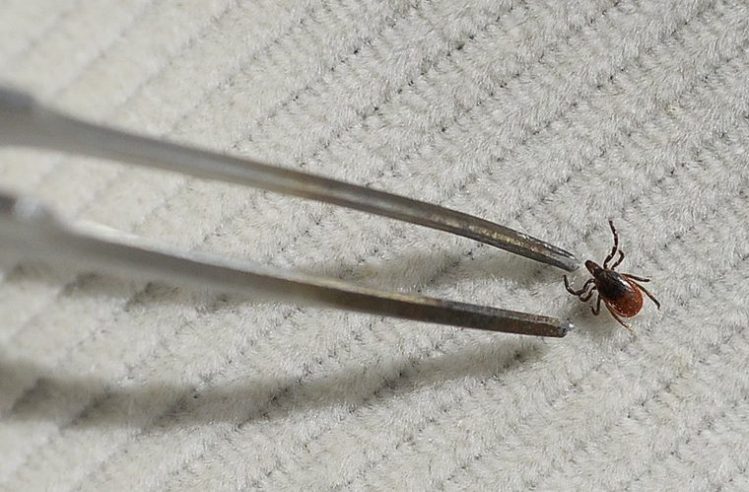A study of deer ticks in Maine suggests that wintering beneath leaves can help them survive harsh, cold weather, but whether they are vulnerable to sudden temperature drops remains unclear.
As summer tick season begins, scientists are reporting that deer ticks – the ticks that transmit Lyme disease – are more abundant in Maine than they were last year.
This season’s newly hatched deer ticks are currently in the nymph stage – about the size of a poppyseed and looking for hosts to feed on. It’s one of the highest-risk times of year for contracting Lyme disease because the ticks are hard to see. By early fall, deer ticks will reach adulthood when females will be about the size of a sesame seed and the males slightly smaller.
Learning what affects tick mortality is a priority for scientists as its range in Maine continues to expand and Lyme disease becomes more common.
In 2015, following a harsh winter, 1,176 people tested positive for Lyme disease, down from 1,399 cases in 2014, according to the Maine Center for Disease Control and Prevention. However, that number is significantly higher than the few hundred cases per year reported in Maine in the early- to mid-2000s.
There were 107 cases of Lyme disease through April 30 this year, according to the Maine CDC. Most cases of Lyme occur later in the year when ticks are more active.
Researchers from Maine Medical Center Research Institute’s “tick lab” monitored ticks in a wooded area in Cape Elizabeth October through April, part of a $15,000, two-year study of tick mortality funded by Cornell University.
At the site off Charles Jordan Road, the researchers placed 24 containers, each holding three vials of 20 ticks per vial. The ticks were exposed to different environmental conditions – uncovered, covered with snow when snow was present, covered with leaves, and covered with leaves and snow. Devices monitored the ticks every 30 seconds to see whether they were still alive.
The study isn’t complete, but preliminary results suggest leaves are more important than snow to tick survival, said Charles Lubelczyk, the research institute’s vector ecologist.
“The leaf litter was really important in giving them cover and keeping the ticks alive,” Lubelczyk said. “If you want to reduce ticks on your property, make sure to rake your leaves.”
He said snow, which was thought to provide ticks with insulation from the cold, did not make much difference in tick mortality. But snow cover was often thin during the warm 2015-16 winter, so it will be interesting to compare it with next winter, especially if there’s more snow, he said.
“Even though we had snow, the snow wasn’t very deep, maybe seven inches at most at any one time,” Lubelczyk said. A couple inches of snow may not be enough to insulate ticks from the cold, but 15-20 inches might make a difference, he said.
Lubelczyk said researchers are still combing through last winter’s data to learn how much of an impact sudden drops in temperature have on tick mortality. This past winter, there were severe swings in temperature, which is believed to be harmful to ticks. The ticks are known to be able to slowly acclimate to lower temperatures but may have a more difficult time when the temperature drops suddenly.
The researchers will also compare how the ticks fared in Cape Elizabeth against those from another study site in New Haven, Connecticut.
Maine scientists say the mild winter appears to have had little impact on tick populations.
“It’s definitely a heavy tick season,” said James Dill, pest management specialist at the University of Maine Cooperative Extension, where Maine residents can send ticks for identification.
Dill said deer tick larvae feed on rodents – such as mice, chipmunks and squirrels – and there are indications that rodent populations will be higher this spring and summer, which could boost tick populations.
But Dill said other factors could lead to a population decline as summer goes on.
“There are predictions that we will have a hot, dry summer, which could help knock the tick populations back,” Dill said. Ticks thrive in moist environments, but hot, sunny and dry weather kills them.
Send questions/comments to the editors.




Comments are no longer available on this story